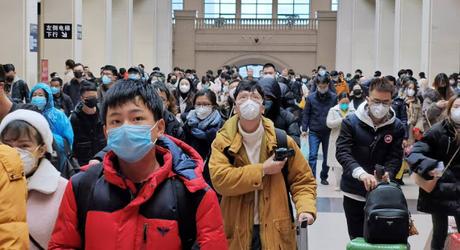 (The photo above, from Getty Images, was found at wgbh.org.)
(The photo above, from Getty Images, was found at wgbh.org.)Anytime the media does a story about the Coronavirus, they show pictures of people wearing surgical masks (like in the picture above). This is true not in just Asia, but in other parts of the world also. These people evidently believe these masks will keep them from getting the new virus. And this belief is resulting a shortage of those masks.
But there is a bigger problem than that -- It doesn't work! A surgical mask will not protect you from the Coronavirus.
Here's the truth from Laura Geggel at livescience.com:
Can wearing a medical face mask protect you against the new coronavirus? It's a question many people, including pet owners who are putting canine face masks on their dogs, are asking. If it's a regular surgical face mask, the answer is "no," Dr. William Schaffner, an infectious-disease specialist at Vanderbilt University in Tennessee, told Live Science. . . . The surgical mask is intended for surgeons, because these products do a good job of keeping pathogens from the doctor's nose and mouth from entering the surgical field, Schaffner said. In some Asian countries, such as Japan and China, it's not uncommon to see people wearing surgical masks in public to protect against pathogens and pollution. But those masks don't help much in the context of a virus, Schaffner said. "They're not designed to keep out viral particles, and they're not nearly as tightly fitted around your nose and cheeks," as an N95 respirator, he said. "Could they be of some use? Yes, but the effect is likely to be modest," Schaffner said. He noted that some people wear surgical masks because they are sick with a cold or the flu and they don't want to get other people sick. But if you're sick, it's best just not to go to public areas. "That's the time to stay home," Schaffner said. A better way to avoid getting the coronavirus is to, first and foremost, postpone any travel to China, where the virus originated and has infected more than 11,000 people, according to The Washington Post. You can also thoroughly wash your hands; avoid touching your eyes, nose and mouth with unwashed hands; avoid close contact with people who are sick; and disinfect frequently touched objects and surfaces, the Centers for Disease Control and Prevention reported. As for pet owners putting face masks on their dogs, there's no evidence that dogs can even catch the coronavirus, so "you don't need to do that," Schaffner said.

